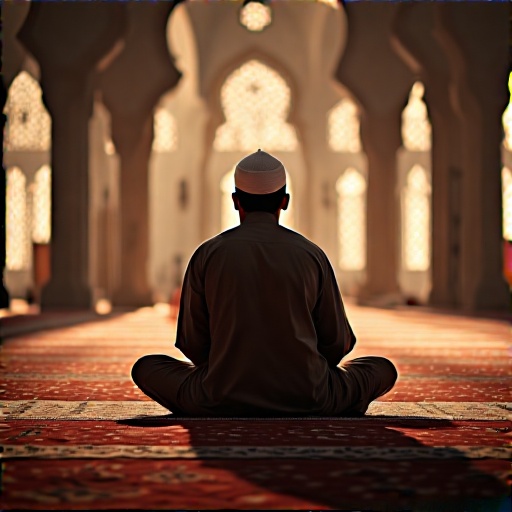Eid al-Adha is a day of gratitude, joy, and devotion, marked by special Sunnah acts that reflect the spirit of Islam. Following the Sunnah of Prophet Muhammad (PBUH) on Eid brings immense blessings and helps every Muslim experience the true meaning of this sacred festival.
Eid al-Adha commemorates the devotion of Prophet Ibrahim (PBUH) and his willingness to sacrifice for Allah. The Sunnah acts on Eid are not only traditions but acts of worship that strengthen faith and community bonds.
وَٱلۡبُدۡنَ جَعَلۡنَـٰهَا لَكُم مِّن شَعَـٰۤىِٕرِ ٱللَّهِ لَكُمۡ فِیهَا خَیۡرࣱۖ فَٱذۡكُرُوا۟ ٱسۡمَ ٱللَّهِ عَلَیۡهَا صَوَاۤفَّۖ فَإِذَا وَجَبَتۡ جُنُوبُهَا فَكُلُوا۟ مِنۡهَا وَأَطۡعِمُوا۟ ٱلۡقَانِعَ وَٱلۡمُعۡتَرَّۚ كَذَ ٰلِكَ سَخَّرۡنَـٰهَا لَكُمۡ لَعَلَّكُمۡ تَشۡكُرُونَ
And the Budn (cows, oxen, or camels driven to be offered as sacrifices by the pilgrims at the sanctuary of Makkah.) We have made for you as among the Symbols of Allah, therein you have much good. So mention the Name of Allah over them when they are drawn up in lines (for sacrifice). Then, when they are down on their sides (after slaughter), eat thereof, and feed the beggar who does not ask (men), and the beggar who asks (men). Thus have We made them subject to you that you may be grateful.
[22:36]
Preparing for Eid: Fajr Prayer, Ghusl, and Cleanliness
Morning Sunnah Acts
- Pray Fajr in the local mosque: Begin Eid day with the Fajr prayer in congregation, as it is a source of reward and sets a spiritual tone for the day.
- Ghusl (ritual bath): The Prophet (PBUH) would perform ghusl before Eid prayer. This act of cleanliness is highly recommended.
Ibn ‘Abbas narrated: “The Messenger of Allah (PBUH) used to have a bath on the day of Fitr.” (Ibn Majah) - Use Miswak: Cleansing the mouth with miswak is Sunnah and pleasing to Allah.
Aisha (RA) narrated: “The siwak is a means of purifying the mouth and pleasing the Rabb.” (An-Nasai) - Wear perfume (for men): The Prophet (PBUH) would apply perfume on Eid.
- Wear your best clothes: Preferably white, as it is pure and modest.
The Prophet (PBUH) said: “Wear white clothes because they are the purest and they are closest to modesty…” (An-Nasai) - Eat before leaving (on Eid al-Fitr), but after Eid prayer on Eid al-Adha:
The Messenger (PBUH) would not eat on Eid al-Adha until he returned and ate from his sacrifice. (Ahmad)
Attending Eid Prayer: Eidgah and the Path of Takbir
Eid Prayer Sunnah
- Pray at the Eidgah (open field): The Prophet (PBUH) preferred performing Eid prayer in an open area unless there was a valid excuse (e.g., illness, weather).
- Say Takbir on the way: Recite “Allahu Akbar” and praise Allah aloud while walking to the Eidgah.
- Use different routes: The Prophet (PBUH) would go to the Eid prayer by one route and return by another, spreading greetings and joy.
How to Perform Eid Prayer
- Two rak’ahs, led by the imam, with extra takbirs (7 in the first rak’ah, 5 in the second, according to the Sunnah).
- Listen to the khutbah (sermon) after the prayer, as it contains important reminders.
The Sunnah of Sacrifice (Qurbani) and Distribution
Timing and Rules of Sacrifice
- Sacrifice begins after Eid prayer: The time for sacrifice starts after the Eid al-Adha prayer. Eid al-Adha is observed for three days: 10th, 11th, and 12th Dhul-Hijjah. The 10th Dhul-Hijjah is the main day for sacrifices, and the following days continue with festivities, meat distribution, and family gatherings.
- Intention (Niyyah): Make a sincere intention to perform Qurbani for Allah’s pleasure.
- Animal requirements: The animal must be healthy, free from defects, and from approved livestock (sheep, goats, cattle, camels).
- Pronounce Allah’s name: Say “Bismillah, Allahu Akbar” at the time of slaughter.
Distribution of Meat
- Divide the meat into three parts:
- One part for your family
- One part for relatives and friends
- One part for the poor and needy
- Share generously: The essence of Eid al-Adha is sharing blessings with others, especially those in need.
Other Important Sunnah and Common Questions
Women and Children Attending Eid
- Women and children are encouraged to attend Eid prayer, even if not praying (e.g., menstruating women should attend but not enter the prayer area).
Making Dua and Remembering Allah
- Use Allah’s names in supplication, especially on this blessed day, seeking forgiveness and blessings.
General Eid Etiquette
- Greet fellow Muslims with warmth and joy.
- Avoid extravagance in clothing and celebration.
- Maintain humility, gratitude, and care for the less fortunate.







